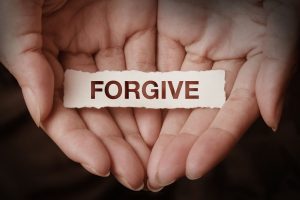Forgive and Forget?

So goes the saying, but what does it really mean. What do we mean by forgiveness and do we really forget someone we’ve forgiven?
To forgive someone is often difficult. We feel here is something they should do to earn our forgiveness but the thing is – they most often don’t understand they actually need to be forgiven.
In their mind they may not have done anything worthy of or requiring forgiveness.
Sometimes they do, but more often they don’t.
More often than not when we forgive someone, we are doing it for our own benefit.
You see, holding a resentment against someone for something they have done, not done, or just some way in which we perceive they have erred against us is actually our problem, yours and mine, and not theirs.
Holding a grudge or resentment against someone for whatever reason screws us up, not them.
Buddha said it is like picking up a hot coal and expecting the other person to be burnt.
When we hold a grudge you and I are locking up space in our internal filing systems which would be much better used for something else such as our own growth.
Then there’s the mirror image.
There are occasions when you and I ask for forgiveness from someone else for some error we have made in our relationship with them.
And quite often the thing for which we are begging forgiveness may not be such a big deal for the other party. They may say “Sure, you’re forgiven” – but to you and I it doesn’t really have much meaning.
This time the problem is still within ourselves, the resentment is actually against ourselves. It isn’t the other person who should forgive. It’s you and I who need to forgive ourselves.
But what about the ‘forget’ bit? The saying implies once the forgiveness is achieved all is forgotten but is that really the case?
The other person is still there, the memory is still there, and it always has the potential to rise up again and restart the process of resentment.
To really complete the forgiving process, it isn’t necessary to completely forget the person or the incident which caused the problem. In our minds, yours and mine, things have to change.
You and I have to complete the forgiveness process by changing our perception of the issue. We have to re-file it from the ‘grudges and resentments’ folder to somewhere that takes up less space – maybe ‘lessons learned’ or somewhere similar.
There are many techniques we can use to do this and lots of people teach them but one of the greatest teachers is the Dalai Lama.
His philosophy is based on love for all, but you may think he has a great deal to forgive for what has been done to his country, and sometimes it is very difficult to forgive.
It requires you and I to change our mindsets about the people we want to forgive to free ourselves from the hold they have over us.
The Dalai Lama refers to those people he finds it difficult to forgive, such as the Chinese Government, as his ‘sacred friends’ and this term is used to focus his, and your and my, attention on those people for whom we find forgiveness very difficult indeed.
Who are your ‘sacred friends’? If you don’t have any you are truly blessed.
To help here is a short prayer or mantra from the Dalai Lama you can use, and you can substitute ‘I’, someone’s name, or ‘they’ for the ‘you’ in this verse as you direct it to whoever you wish to forgive.
“May you be truly happy
May you live in peace
May you live in love
May you know the power of forgiveness
May you know that your life has deep meaning and good purpose”

